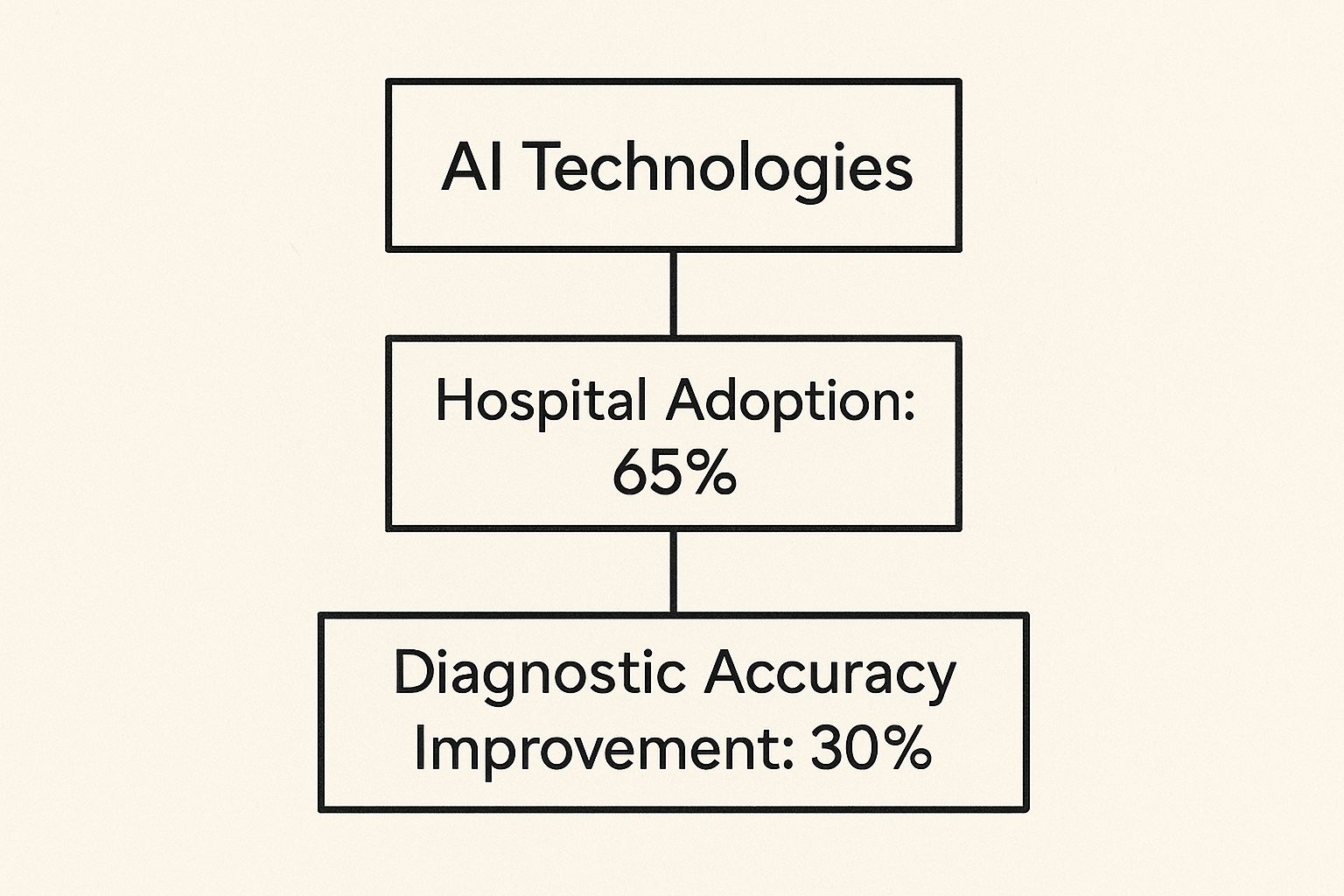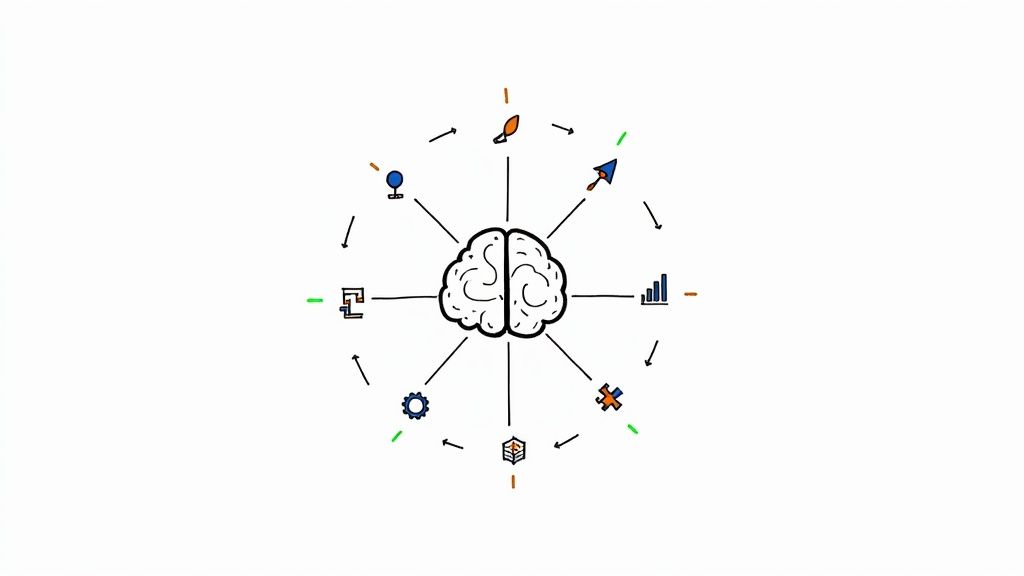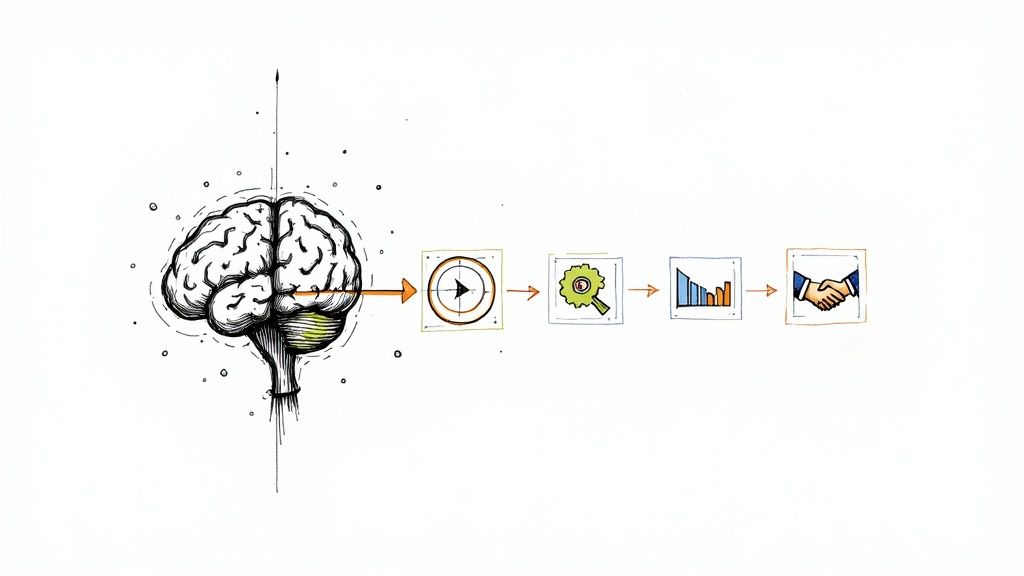AI for Healthcare: Transforming Patient Care Today
Explore how AI for healthcare is improving patient outcomes with innovative applications. Learn more about implementing medical AI successfully.

Artificial intelligence in healthcare isn't some far-off idea anymore; it's here now, working alongside medical professionals as a powerful new colleague. Think of it less as a replacement for human doctors and more as a highly specialised assistant. It can analyse vast amounts of data in seconds, helping clinicians improve patient outcomes and make their daily work more efficient. For anyone in a leadership role within the German and European healthcare sectors, getting to grips with this technology is no longer optional.
The New Era of AI in Healthcare
We've entered a new age of medicine, one where artificial intelligence is making a real difference. It’s not about taking over but about augmenting the skills of healthcare professionals. AI provides a powerful analytical engine that can sift through complex information at a speed and scale that was previously unthinkable.
This isn't just a theoretical shift; it’s already delivering tangible results. For healthcare leaders, understanding how AI works is crucial for future-proofing their organisations and providing better care. The biggest impacts are being felt in a few key areas:
- Smarter Diagnostics: AI algorithms can spot patterns in medical images and patient data that are often invisible to the human eye. This leads to earlier, more accurate diagnoses for conditions ranging from cancer to diabetic retinopathy.
- Smoother Hospital Operations: By automating routine administrative tasks and optimising how resources like beds and staff are allocated, AI frees up clinicians to spend more time where it counts—with their patients.
- Truly Personalised Medicine: AI can help design treatment plans based on a patient's specific genetic makeup, lifestyle, and medical history. This moves us away from one-size-fits-all medicine towards something far more precise and effective.
The Accelerating Growth of AI Adoption
The momentum behind AI for healthcare is impossible to ignore, especially across Europe. The market, with Germany playing a key role, was valued at USD 7.92 billion in 2024 and is projected to soar to an incredible USD 143.02 billion by 2033. This explosive growth is fuelled by major investments in digital health infrastructure and forward-thinking initiatives like the European Health Data Space (EHDS), which aims to make health data more accessible for research and innovation. You can read the full research about these market trends to grasp the sheer scale of the opportunity.
The infographic below illustrates how core AI technologies are directly influencing hospital adoption and, in turn, diagnostic accuracy.

As you can see, there's a clear connection. As the foundational AI technologies become more sophisticated, their use in clinical settings grows, leading to significant improvements in diagnostic performance. But to capture these benefits, you need a plan. As we explored in our AI adoption guide, a solid AI strategy framework gives you the roadmap needed to navigate this new terrain with confidence.
To better understand the tools driving this change, it helps to look at the specific technologies involved and what they actually do.
Key AI Technologies Transforming Healthcare
| AI Technology | Primary Application in Healthcare | Example Use Case |
|---|---|---|
| Machine Learning (ML) | Identifying patterns in data to predict outcomes and classify information. | Analysing patient records to predict the likelihood of disease onset. |
| Natural Language Processing (NLP) | Understanding and interpreting human language from clinical notes and reports. | Extracting key patient information from unstructured doctors' notes. |
| Computer Vision | Analysing and interpreting medical images like X-rays, CT scans, and MRIs. | Detecting tumours or other anomalies in radiological scans. |
| Robotics | Automating physical tasks and assisting in surgical procedures. | Performing precision movements in minimally invasive surgery. |
These technologies are the building blocks of the AI-powered healthcare system. Each plays a distinct but often interconnected role, from making sense of a patient's chart to guiding a surgeon's hand.
How AI Is Actively Reshaping Patient Care
Forget the futuristic hype. Artificial intelligence has moved beyond the research lab and is already making a real difference on the front lines of medicine. It’s not some far-off promise; it's a practical tool that’s actively improving how healthcare is delivered today. From the radiologist's darkened room to the bustling hospital administrator's office, AI is becoming an essential partner in improving both patient outcomes and operational efficiency.

This shift is clearest in four key areas where AI is already delivering powerful results. It's making medical imaging more precise, fast-tracking drug discovery, personalising treatment for individual patients, and streamlining how hospitals run. Getting to grips with these applications is the first step in seeing the full potential of AI for healthcare. For an even closer look, feel free to explore our library of real-world use cases.
Sharpening Medical Imaging and Diagnostics
Medical imaging is one of the most mature and impactful applications of AI in the healthcare space. AI algorithms, especially those built on computer vision, can scan X-rays, MRIs, and CTs with a staggering level of precision. Trained on vast libraries of millions of scans, these systems learn to spot subtle patterns and anomalies that the human eye might overlook.
Think of it as giving a radiologist a tireless assistant with a perfect, photographic memory of every scan it has ever processed. This doesn't replace the expert; it empowers them. The AI flags potential areas of concern, which allows for quicker and more accurate diagnoses of conditions like cancer, stroke, and complex neurological disorders.
Recent research shows how advanced AI systems can correctly diagnose up to 85% of highly complex medical cases presented in the New England Journal of Medicine—a rate more than four times higher than a group of experienced physicians.
This kind of diagnostic support underscores the profound impact AI can have. To bring this capability into your organisation, you need a clear vision, which is where dedicated AI strategy consulting becomes invaluable.
Accelerating Drug Discovery and Development
Getting a new drug from the lab to the pharmacy is a notoriously long, expensive, and often frustrating journey. AI is fundamentally changing that equation by dramatically compressing the research and development (R&D) timeline. It can sift through massive biological datasets to identify promising drug candidates far faster than any traditional method ever could.
Essentially, AI models can predict how different molecules will behave and interact within the body, allowing researchers to zero in on the most viable compounds from the start. This drastically cuts down the time and expense tied up in preclinical trials.
- Target Identification: AI can pinpoint the specific proteins and genes linked to a disease.
- Compound Screening: It simulates how thousands of potential drugs might interact with a biological target.
- Clinical Trial Optimisation: AI helps design smarter, more efficient clinical trials by identifying the ideal patient groups.
This acceleration means life-saving treatments can reach the people who need them years sooner than was previously possible.
Personalising Patient Treatment Plans
The old "one-size-fits-all" approach to medicine is fading, and AI is leading the way to a more personalised era. Personalised medicine—tailoring treatments to an individual’s unique genetic code, lifestyle, and environment—is no longer just a concept. AI is the engine making it a reality.
By analysing a patient's genomic data alongside their clinical history, AI can predict which specific treatments are most likely to work for them. This has been a game-changer in fields like oncology, where AI helps match cancer patients with targeted therapies that offer the highest chance of success and the lowest risk of side effects. This requires a deep understanding of project goals, which a tool like an AI requirements analysis can help clarify.
Optimising Hospital Operations
Beyond the examination room, AI is also revolutionising the business side of healthcare. Hospitals are incredibly complex organisations facing immense logistical hurdles every single day. AI-powered tools are stepping in to automate tedious admin, predict patient admission rates, and optimise the allocation of critical resources.
For example, AI can manage staff schedules to prevent burnout, predict when a critical piece of equipment needs maintenance to avoid downtime, and streamline the patient billing process to catch errors. By taking on these operational burdens, AI gives clinicians and administrators their most valuable resource back: time to focus on what matters most. The journey starts with a solid plan, which an AI Strategy consulting tool can help you build. Working with our expert team can further ensure your strategic vision aligns with these powerful applications.
The Strategic Benefits of AI in Healthcare
Adopting AI in healthcare isn't about chasing the latest tech trend. It's a strategic move with real, measurable benefits that touch every corner of a medical organisation, from patient outcomes to financial health and the future of medicine itself. When leaders truly commit to bringing AI into their operations, they’re not just buying software; they’re investing in a more intelligent, responsive, and effective way of delivering care.
The most powerful benefit, without a doubt, is how AI directly enhances patient health. AI models can chew through immense datasets—far more than any human team could—to spot patterns and provide clinicians with insights that lead to better, more confident decisions.
Think about it in practice. An AI algorithm might analyse thousands of medical images and flag subtle anomalies that signal the very early stages of a disease, long before they'd be obvious to the human eye. This allows for treatment when it’s most likely to succeed, shifting the entire paradigm from reacting to illness to proactively preventing it.
Driving Serious Operational Efficiency
Beyond the examination room, AI is a powerhouse for streamlining the complex, often frustrating, administrative side of healthcare. The sheer volume of paperwork, scheduling conflicts, and supply chain logistics can bog down even the best-run facilities. This is where AI-driven automation shines, taking over repetitive tasks and freeing up your most valuable resource: your people.
Here’s what that looks like on the ground:
- Smarter Workflows: Imagine patient scheduling, insurance claim processing, and billing happening almost automatically, with minimal human intervention. This lets administrative staff focus on what matters most—the patient experience.
- Intelligent Resource Planning: Predictive analytics can forecast patient inflow, helping hospitals get ahead of demand by optimising staff schedules and ensuring enough beds are available.
- A More Resilient Supply Chain: AI can manage medical inventories, automatically reordering supplies before they run low and preventing costly waste from overstocking.
By getting a handle on these operational hurdles, AI doesn't just cut costs. It builds a more agile and resilient healthcare system that can better handle whatever comes its way.
Speeding Up Medical Research and Discovery
The third pillar of AI's value is its ability to radically speed up medical innovation. Historically, developing new drugs and treatments has been a painstakingly slow and eye-wateringly expensive process. AI gives researchers the tools to analyse complex biological data and pinpoint promising research paths at a pace we've never seen before.
Germany is a great example of this in action. The country is a key player in the European AI healthcare market, which is expected to explode from USD 687.1 million in 2023 to USD 6.6 billion by 2030. This isn't happening by accident. It's fuelled by government support like the National Health Data Lab, which gives researchers access to pseudonymised health data from roughly 75 million people to advance AI research. You can discover more insights about these AI healthcare statistics to see just how significant this investment is.
AI fundamentally shortens the innovation cycle. It allows researchers to move from hypothesis to validated insight more quickly, bringing life-saving treatments to market faster and more affordably.
This ability to quickly test theories and find connections hidden in the data is what truly changes the game. But to capture these benefits, you can't just dive in without a plan. Developing a solid AI strategy framework is crucial to making sure your technology investments are directly tied to your core goals of improving patient care, boosting efficiency, and pushing the boundaries of medicine.
Navigating the Challenges of Healthcare AI
The promise of AI in healthcare is enormous, but getting there isn’t a straight line. Bringing these powerful tools into the real world is far more complex than just installing new software. For any leader in this space, looking these hurdles squarely in the eye is the first and most critical step. Only by tackling them head-on can we transform AI’s potential into tangible improvements for patient care and organisational efficiency. A proactive strategy isn't just a good idea; it's essential.
Successfully weaving AI into the fabric of healthcare means navigating a minefield of data privacy rules, thorny ethical questions, and serious technical headaches. For organisations across Europe, the General Data Protection Regulation (GDPR) sets an incredibly high standard for handling patient data. And that's before you even get to the practical problem of making shiny new AI tools talk to hospital IT systems that are often decades old.

Upholding Data Privacy and Regulatory Compliance
Data fuels every AI system, but in healthcare, that data is deeply personal and fiercely protected. The number one challenge is ensuring iron-clad compliance with regulations like GDPR. This means any AI application has to be built from the ground up with privacy baked into its very core.
Organisations need robust data governance policies that spell out exactly how patient data is gathered, stored, and applied. Some of the most effective strategies include:
- Data Anonymisation: Systematically stripping all personally identifiable information (PII) from data before it ever touches an AI model for training.
- Federated Learning: This clever technique trains AI models locally, right inside a hospital's secure network. The sensitive data never leaves the premises; only the learnings from it are shared.
- Transparent Consent: We must be crystal clear with patients about how their data might support AI initiatives, giving them explicit and easy-to-understand control.
While initiatives like the European Health Data Space (EHDS) aim to standardise secure data sharing, the ultimate responsibility still rests with each individual organisation.
Answering Complex Ethical Questions
Go beyond the legal requirements, and you’ll find a tangled web of ethical dilemmas. AI algorithms learn from historical data, and if that data contains hidden biases—and it almost always does—the AI can easily perpetuate or even worsen them. An algorithm trained mostly on data from one demographic, for example, might perform poorly for others, creating new and dangerous health disparities.
A core ethical duty is to guarantee fairness and equity in AI-driven healthcare. This demands constant auditing of algorithms for bias and a commitment to ensuring AI's benefits are shared justly across all patient groups.
Building trust is absolutely paramount. Clinicians and patients need to understand, at least in principle, how an AI arrived at its recommendation. The infamous "black box" problem, where an AI’s decision-making process is a complete mystery, is a huge roadblock to clinical adoption. That's why developing explainable AI (XAI) is such a key area of research—it aims to make these tools trustworthy partners, not opaque oracles. This ethical journey must begin with a thorough AI requirements analysis that tackles these issues from day one.
Integrating with Legacy IT Systems
Let's be honest: many healthcare organisations run on a patchwork of old IT systems. These systems were never built to speak to each other, let alone connect to modern AI platforms. This lack of interoperability is a massive technical hurdle. In fact, simply extracting and standardising data from these disconnected silos is often the most time-consuming and expensive part of an AI project.
A phased approach is usually the smartest way forward. Instead of a risky "big bang" overhaul, organisations can build digital "bridges" between critical systems to support specific, high-impact AI projects. This could mean using middleware or APIs to link an AI-powered diagnostic tool directly to an existing electronic health record (EHR) system. This is a genuinely complex task where specialised AI strategy consulting can provide a much-needed clear path forward.
Overcoming the Talent Shortage
Finally, we have a people problem. There's a major shortage of professionals who have the right mix of skills for healthcare AI—a deep understanding of both clinical practice and data science. Finding people who are fluent in the languages of both medicine and machine learning is exceptionally difficult.
To bridge this gap, organisations have to invest in training their existing teams and deliberately building multidisciplinary squads. Fostering a culture of AI co creation, where doctors, IT specialists, and data scientists collaborate from the start, is crucial. This ensures that the solutions you build aren't just technically brilliant, but also clinically useful and practically grounded. Partnering with an external group like our expert team can also be a powerful way to inject specialised knowledge and accelerate your projects.
Building Your Healthcare AI Roadmap
Moving from theory to practice with AI in a healthcare setting isn't something that just happens. You need a deliberate, structured plan. A successful AI journey never happens by accident; it starts with a clear vision and a practical roadmap that guides every single decision. This process takes the mystery out of implementation and turns big ambitions into tangible results.
The very first step is to get everyone on the same page about what AI is supposed to achieve in your organisation. This isn't just a tech problem to solve—it's a core strategic decision that needs buy-in from your clinical, operational, and IT leaders. A good AI strategy consulting partner can be invaluable here, facilitating those early, crucial conversations to ensure everyone is aiming for the same goal. Think of this shared vision as your North Star; it keeps projects from drifting off course.
Once you know where you're going, the next step is to break that vision down into specific, high-impact projects. This means taking a hard, pragmatic look at where AI can deliver the most value, and do it quickly.
Identifying High-Impact Use Cases
Let's be realistic: not all AI projects are created equal. The trick is to find that sweet spot between high value and achievable complexity. I always advise leaders to start by mapping out their organisation’s biggest headaches. Are you dealing with diagnostic bottlenecks? Crushing administrative burdens? Or maybe patient flow is a constant struggle? A thorough AI requirements analysis is essential here to properly define the problem you're trying to fix.
Focus on initiatives that offer a clear and compelling return, like:
- Automating routine administrative tasks to free up skilled staff for patient-facing work.
- Using predictive models for patient admissions to get ahead of demand and manage resources better.
- Deploying AI-assisted diagnostic tools in one specific clinical area to improve accuracy and speed.
Our interactive AI Strategy consulting tool can help cut through the noise in this discovery phase, helping you pinpoint the most promising opportunities for your organisation. For more concrete ideas, it's also worth browsing our library of real-world use cases.
Adopting a Structured Framework
With your priority use cases identified, you need a solid framework to guide the execution. A structured approach ensures every project is built on a foundation of clear goals, defined metrics, and responsible governance. Our proprietary AI strategy framework offers a clear path, breaking the journey down into manageable stages.
A well-defined strategy framework is what turns a collection of isolated AI projects into a cohesive, organisation-wide capability. It provides the structure you need to scale successes, manage risks, and prove ongoing value to your stakeholders.
This disciplined approach is becoming more important by the day, especially as national data initiatives come online. For instance, Germany is making huge strides in digital innovation, setting the stage for the 2025 launch of its National Health Data Lab. This programme will give researchers access to pseudonymised health data from roughly 75 million people, all with the goal of improving healthcare delivery. As these national efforts align with the broader European Health Data Space (EHDS), having your own clear internal strategy is no longer a "nice-to-have"—it's essential for plugging into these new data ecosystems. You can read the full research about these landmark data initiatives to get a sense of their continental impact.
Assembling Your AI Team
Technology alone won't get you there; people will. Assembling the right team is arguably the most critical piece of your entire roadmap. Success really hinges on creating a culture of collaboration, where clinical experts, data scientists, and IT professionals work together as a single unit. We call this AI co creation, and it's the key to ensuring that the solutions you build are not just technically impressive, but also clinically relevant and practical enough for the real world.
For organisations looking to get a jump-start, a focused workshop can be an incredibly powerful catalyst. You might want to check out our AI Strategy Workshop, which is designed specifically to align your leadership team and kickstart your implementation journey. At the end of the day, a successful AI programme is about empowering your people with the right tools, a clear vision, and a collaborative spirit.
Your Partner in Healthcare Innovation
Throughout this guide, we've seen that AI for healthcare isn't some far-off concept. It's happening right now, creating genuine opportunities to improve patient care and make our health systems work smarter. The real challenge, of course, is moving from understanding these ideas to actually putting them into practice. It’s time to take that crucial next step, turning a strategic vision into tangible results that can redefine what's possible in medicine.
At Ekipa, this is exactly where we come in. Our entire philosophy is built on AI co-creation, meaning we work shoulder-to-shoulder with your teams. We focus on building solutions that aren't just technically brilliant, but are also clinically sound and fit seamlessly into your existing workflows. We help you cut through the noise and focus on what truly matters.

Begin Your Transformation Journey
Starting on this path takes more than just powerful technology; it demands a clear strategy and experienced guidance. As we've touched on, a structured approach is absolutely essential for success. It all starts with pinpointing the right opportunities and building a solid business case that everyone can get behind.
We offer the expertise and tools to help you do just that:
- Define Your Vision: Our AI strategy consulting services are designed to align your leadership around a shared, actionable goal for bringing AI into your organisation.
- Build Your Plan: The Ekipa AI strategy framework provides a proven, step-by-step methodology to guide your implementation from the first idea to the final rollout.
- Accelerate Discovery: Try our AI Strategy consulting tool to quickly identify and prioritise high-value use cases that will make a real difference.
- Clarify Needs: A proper AI requirements analysis ensures your projects are well-defined from the start, setting them up for success.
The most significant advancements in healthcare will come from the intelligent application of technology to solve real-world clinical and operational problems. The key is to start with a clear purpose and a trusted partner.
The potential of AI in healthcare is immense, from making diagnoses more accurate to optimising how a hospital uses its precious resources. Our mission is to help you unlock that potential.
To start your own transformation and see our library of real-world use cases, get in touch with our expert team today. We’re here to help you navigate the complexities and achieve remarkable things.
Frequently Asked Questions About AI in Healthcare
As leaders start to seriously consider what AI can do for their healthcare organisations, a lot of very good questions come to the surface. Getting to grips with the reality of implementation, the ethics involved, and how it all works in practice is essential before making any big decisions. Let's walk through some of the most common queries we hear.
Will AI Replace Doctors and Other Healthcare Professionals?
This is probably the most common question, and the answer is a clear no. The goal of AI in healthcare isn't to replace skilled professionals, but to augment their abilities. Think of it as giving your team a powerful new set of tools.
AI is brilliant at handling tasks that are repetitive or involve sifting through enormous amounts of information—things humans find tedious or can't do at speed. By automating these processes, AI frees up doctors, nurses, and technicians to focus on what they do best: applying critical thinking, providing compassionate patient care, and making complex judgement calls. It's a partnership, where technology handles the heavy data lifting so the human experts can focus on the human side of medicine.
What Is the Single Biggest Barrier to AI Implementation?
If there's one hurdle that stands out above all others, it's data. Specifically, the quality of that data and the ability to even get to it. An AI model is only ever as good as the information it’s trained on, and in healthcare, that information is often a mess.
Data is typically fragmented across different departments, stored in old, incompatible systems, and isn't standardised. On top of that, you have strict privacy regulations like GDPR to navigate.
The real work starts before you even think about building an algorithm. It begins with a solid data strategy that addresses governance, standardisation, and modernising your infrastructure. Without that foundation, any AI initiative is built on shaky ground.
For a more detailed look at common questions and their answers, our complete AI in healthcare FAQ page is a great resource.
How Is Patient Data Security and Privacy Ensured?
Protecting patient confidentiality is paramount; it's the bedrock of trust in healthcare. Ensuring data security isn't just a single action but a layered strategy combining legal compliance with clever technology.
- Regulatory Compliance: First and foremost, any system must rigorously adhere to data protection laws like GDPR. This is non-negotiable.
- Data De-identification: Before any data is used to train an AI model, it's scrubbed of personal details through techniques like anonymisation and pseudonymisation.
- Federated Learning: This is a game-changing approach. Instead of moving sensitive data to a central server, the AI model is trained directly within the hospital's own secure network. The data never leaves, only the insights from the model are shared.
These methods, combined with strong cybersecurity defences and strict access controls, create a secure environment where AI can deliver value without compromising patient privacy. Navigating this complex journey requires a partner who lives and breathes these challenges.
At Ekipa, we help you move from a strategic idea to a real-world AI solution that is secure, compliant, and genuinely impactful. Our next-gen AI strategy consulting platform is designed to help you find and act on AI opportunities with confidence. Our methodology is built upon years of experience, and you can trust our expert team to guide you.



